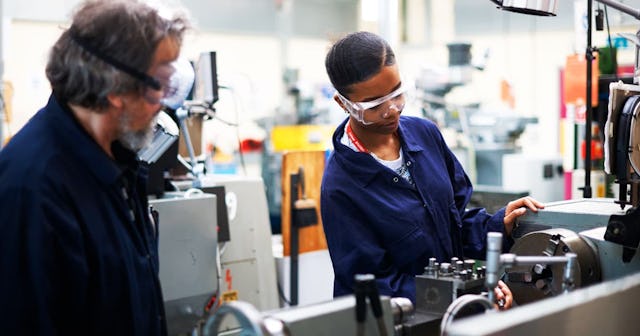Trade Schools Alone Won’t Fix The Problem -- We Need To Make College Accessible For EVERYONE

There’s a notion that college isn’t for everyone, but is that actually true? That’s debatable. Sure, some kids may not feel that they’re equipped to handle college. If their previous school experience was difficult, the idea of more years of learning feels impossible. For those who feel that a traditional college is out of their reach, there’s always the suggestion of trade school. But what if trade school isn’t the answer? Maybe the answer isn’t that college isn’t for everyone — it’s that not everyone has the same level of access to higher education.
The concept of college for all is currently a very big political talking point. Many progressive folks realize that the thing holding people back from having better lives is access — access to the resources that could enable them to “make something of themselves.” Making college more affordable or even free would greatly level the playing field. And that’s exactly why so many people are against it. Once you’re giving everyone the same kind of opportunities, there is no excuse to hold people back.
Education for kids shouldn’t end after high school. More importantly, if it does, that should be a conscious choice, and not a matter of circumstance. Those who want to pursue further education should have more than two options. To say that some kids just aren’t cut out for traditional college and only offer them trade school isn’t helpful. What if those kids are college material and are simply not getting the guidance they need? Counselors and society are quick to say they can’t, but never give them a workable alternative.
As college costs continue to rise even though wages don’t, we’re only going to see a starker equity contrast. For many, college already feels like a luxury. According to the most recent data on student loans via Forbes, there are 44.7 million borrowers with a cumulative debt of $1.56 trillion. On average, loan borrowers from the class of 2017 owe $28,650. Even if you take out student loans, you still need a guarantee you’ll be able to pay them back when it’s time. Poor students are being priced out of higher education because of high interest rates on loans. And with entry level jobs barely covering the cost of rent, how could they even begin to think about paying back loans? Sure, an Ivy League education doesn’t have to be accessible for everyone. But state colleges should be affordable, if not free.
You can’t ignore the fact that most kids who are being told they aren’t college material are marginalized. Whether they’re poor, kids of color, disabled, or any intersection of the above, they’re at a bigger disadvantage. So many of these kids are hearing higher education isn’t for them simply because of who they are. Far too often, marginalized kids aren’t being given a fair shot, even if they are more than capable. Systemic oppression keeps these kids from being able to get ahead in the world.
Lawmakers and people in power need to start looking at the ways they can support marginalized kids. We can’t expect them to be contributing members of society if they can’t get into the same rooms. Education means access. You can’t pull yourself up by your bootstraps if your boots don’t have laces. By making college more financially accessible for everyone, they would be proving that they’re serious about making the country a better place.
For many people, college is the right path for them. A 2016 report from the Georgetown Center on Education and the Workforce finds that 78 percent of the 7.8 million jobs lost during that time didn’t require a college degree. Since then, 11.6 million jobs have been created, and 99 percent of them have gone to people with a college education. The numbers don’t lie — college is an unspoken requirement to employment. Whether we want to believe it or not, that isn’t going to change anytime soon.
Trade schools aren’t an option for everyone, and they won’t fix the problem. Of course, we need tradespeople with skills like carpenters, electricians, etc. but not everyone is capable of doing those kinds of jobs. There has to be an accessible college education for the people to achieve their desired career path.
Experts say that college graduates earn twice as much as their peers who only graduate high school over their lifetime on average. Looking at it that way, you can see how imperative it is to make college more affordable for everyone. Making college more financially accessible for everyone means that we’d be doing society a greater service in the long run too. Because when everyone is making money, everyone is contributing to the economy. And isn’t that what the government wants? Giving kids access to a higher education translates to a stronger workforce in the long run.
Making college free for all who need it to be free is the only way forward. Education in this country shouldn’t be a privilege, but a right. People don’t magically know everything they need to get ahead when they graduate from high school. And while trade schools are a great alternative for kids who want them, they’re not for everyone. Kids who want to further their education should be able to. Students who can afford higher education already know that they’re going to be okay. But if we invested in marginalized students the same way, there’s no doubt what good it would do. Marginalized kids need to know they live in a country that believes they’re worth investing in.
This article was originally published on